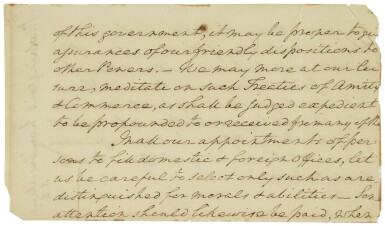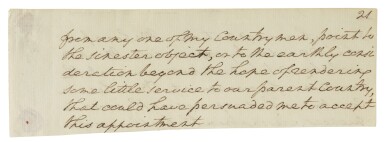WASHINGTON, George (1732-1799). Autograph manuscript fragment, comprising two pages from his "Compend of Husbandry," a notebook containing observations on agriculture and husbandry [Mount Vernon, c.1790s]. Two pages, 102 x 164mm, a single leaf from a pocket-size notebook, paginated "59" and "60" by Washington in upper corners. A leaf from Washington's Husbandry Notebook . A rare leaf from a small-format notebook in which Washington collected advice and techniques from modern agricultural writers including Jethro Tull, Arthur Young, Edward Lisle, and Thomas Hale, whose agricultural reforms were referred to as the "new husbandry." Many of these modern precepts, techniques, and inventions were put into practice at Mount Vernon, which served the former President as an experimental farm. Initially, when he took over Mount Vernon, Washington followed the path of other Virginia planters who cultivated tobacco for export to Great Britain. But as he soon discovered, tobacco was hardly an ideal cash crop, nor was the clay soil of Mount Vernon very suitable for its cultivation. When a glutted market resulted in a sharp decline in the wholesale price of tobacco in the 1760s, "Washington found his dependence upon a single cash export to the mother country unacceptable on economic, and, increasingly, on political grounds" (A. and D.J. Fusonie, George Washington: Pioneer Farmer , p.9). From about 1764 on, Washington experimented a variety of new crops, especially grains: wheat, corn, hops and oats, as well as hemp and flax, and he eventually raised over 60 different crops at Mount Vernon. "Washington's preoccupation with and love of farming at Mount Vernon was complemented by his national vision for the future of agriculture in the new America" (ibid., p.55). Washington was particularly interested in the experiments and theories on soil preparation published in Jethro Tull's 1731 Horse-Hoeing Husbandry , and owned a copy of the expanded third edition of 1751, which "provided descriptions of the four-coultered plow, the drill plow and a comparison of the old and new husbandry" (ibid, p.8). Tull strongly recommended tillage to loosen and enrich soil and denied the usefulness of cow manure – an opinion with which Washington here takes issue, based on his own experience. In the present fragment Washington accompanies chapter and page references with his own observations. [ Together with :] Autograph letter of Christopher Hughes, 25 December 1832, presenting the two leaves to the Rev. Samuel Knight, "Rector of Welwyn, Herts." Provenance : George Washington – Bushrod Washington, his nephew, who inherited Mount Vernon and most of Washington's papers, presented to – Christopher Hughes (1786-1849), careeer diplomat (presented in 1832 to) – Rev. Samuel Johns Knight, of Welwyn, Hertfordshire – Malcolm Forbes (his sale, Christie's, part two, 9 October 2001, lot 15).
WASHINGTON, George (1732-1799). Autograph manuscript fragment, comprising two pages from his "Compend of Husbandry," a notebook containing observations on agriculture and husbandry [Mount Vernon, c.1790s]. Two pages, 102 x 164mm, a single leaf from a pocket-size notebook, paginated "59" and "60" by Washington in upper corners. A leaf from Washington's Husbandry Notebook . A rare leaf from a small-format notebook in which Washington collected advice and techniques from modern agricultural writers including Jethro Tull, Arthur Young, Edward Lisle, and Thomas Hale, whose agricultural reforms were referred to as the "new husbandry." Many of these modern precepts, techniques, and inventions were put into practice at Mount Vernon, which served the former President as an experimental farm. Initially, when he took over Mount Vernon, Washington followed the path of other Virginia planters who cultivated tobacco for export to Great Britain. But as he soon discovered, tobacco was hardly an ideal cash crop, nor was the clay soil of Mount Vernon very suitable for its cultivation. When a glutted market resulted in a sharp decline in the wholesale price of tobacco in the 1760s, "Washington found his dependence upon a single cash export to the mother country unacceptable on economic, and, increasingly, on political grounds" (A. and D.J. Fusonie, George Washington: Pioneer Farmer , p.9). From about 1764 on, Washington experimented a variety of new crops, especially grains: wheat, corn, hops and oats, as well as hemp and flax, and he eventually raised over 60 different crops at Mount Vernon. "Washington's preoccupation with and love of farming at Mount Vernon was complemented by his national vision for the future of agriculture in the new America" (ibid., p.55). Washington was particularly interested in the experiments and theories on soil preparation published in Jethro Tull's 1731 Horse-Hoeing Husbandry , and owned a copy of the expanded third edition of 1751, which "provided descriptions of the four-coultered plow, the drill plow and a comparison of the old and new husbandry" (ibid, p.8). Tull strongly recommended tillage to loosen and enrich soil and denied the usefulness of cow manure – an opinion with which Washington here takes issue, based on his own experience. In the present fragment Washington accompanies chapter and page references with his own observations. [ Together with :] Autograph letter of Christopher Hughes, 25 December 1832, presenting the two leaves to the Rev. Samuel Knight, "Rector of Welwyn, Herts." Provenance : George Washington – Bushrod Washington, his nephew, who inherited Mount Vernon and most of Washington's papers, presented to – Christopher Hughes (1786-1849), careeer diplomat (presented in 1832 to) – Rev. Samuel Johns Knight, of Welwyn, Hertfordshire – Malcolm Forbes (his sale, Christie's, part two, 9 October 2001, lot 15).



.jpg)











Try LotSearch and its premium features for 7 days - without any costs!
Be notified automatically about new items in upcoming auctions.
Create an alert